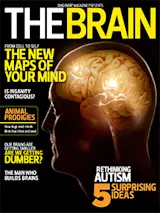Numbers make modern life possible. “In a world without numbers,” University of Rochester neuroscientist Jessica Cantlon and her colleagues observed in the journal Trends in Cognitive Sciences, “we would be unable to build a skyscraper, hold a national election, plan a wedding, or pay for a chicken at the market.”
The central role of numbers in our world testifies to the brain’s uncanny ability to recognize and understand them—and Cantlon is among the researchers trying to find out exactly how that skill works. Traditionally, scientists have thought that we learn to use numbers the same way we learn how to drive a car or to text with two thumbs. In this view, numbers are a kind of technology, a man-made invention to which our all-purpose brains can adapt. History provides some support. The oldest evidence of people using numbers dates back about 30,000 years: bones and antlers scored with notches ...















